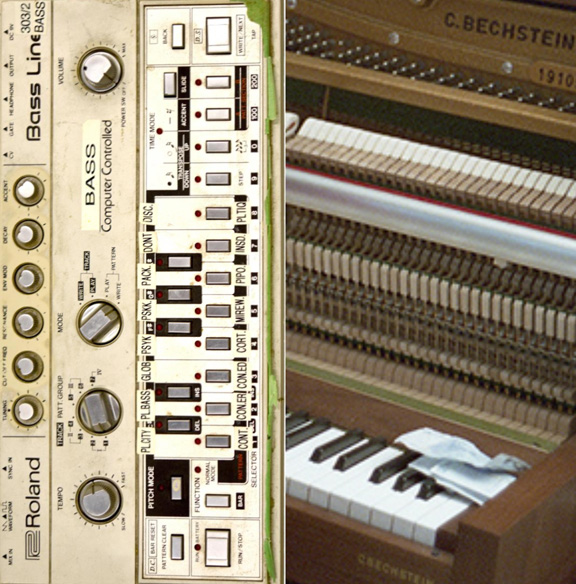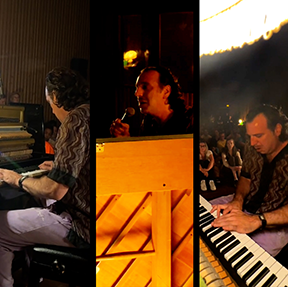 Amongst the deluge of Gonzales-related events lately that we’re busily writing about (Paralympics, single releases, forthcoming new album, concerts and so on), there was a fairly low-key milestone celebration that caught our attention as long-time fans: the 20th anniversary of Gonzales’ seminal Solo Piano album. In what appeared to be almost a “pop-up” performance, Gonzales returned to the sonic birthplace of Solo Piano: Studios Ferber in Eastern Paris on Rue Pierre Mouilliard (who was a pioneer in French aviation and is appropriate for a studio that has enabled many songs to take flight over the years). At the heart of Studios Ferber is Renaud Letang, who’s been engineering and producing for almost 35 years, and has a penchant for analog equipment from the 1970s. Renaud, who is a couple of years older than Gonzales may have met Gonzales in the early 2000s at the tail end of Gonzales’ relationship with the ill-fated German Kitty-Yo label. Somewhere between Take me to Broadway and Feist’s 1234, Gonzales and Letang found the time and inclination to record a few short piano pieces that appeared to be the ultimate confluence of Gonzales’ Jazz/Impressionistic roots, and more recent Indie Rock, Prankster Rap and synth-driven Electro releases. In an interview with Philippe Papineau of Montreal’s Le Devoir, Gonzales explained that Solo Piano gave him, “…a certain musical respect,” which has allowed him to continue to take chances knowing that his audience would follow him into whatever genre and sounds provides inspiration.
Amongst the deluge of Gonzales-related events lately that we’re busily writing about (Paralympics, single releases, forthcoming new album, concerts and so on), there was a fairly low-key milestone celebration that caught our attention as long-time fans: the 20th anniversary of Gonzales’ seminal Solo Piano album. In what appeared to be almost a “pop-up” performance, Gonzales returned to the sonic birthplace of Solo Piano: Studios Ferber in Eastern Paris on Rue Pierre Mouilliard (who was a pioneer in French aviation and is appropriate for a studio that has enabled many songs to take flight over the years). At the heart of Studios Ferber is Renaud Letang, who’s been engineering and producing for almost 35 years, and has a penchant for analog equipment from the 1970s. Renaud, who is a couple of years older than Gonzales may have met Gonzales in the early 2000s at the tail end of Gonzales’ relationship with the ill-fated German Kitty-Yo label. Somewhere between Take me to Broadway and Feist’s 1234, Gonzales and Letang found the time and inclination to record a few short piano pieces that appeared to be the ultimate confluence of Gonzales’ Jazz/Impressionistic roots, and more recent Indie Rock, Prankster Rap and synth-driven Electro releases. In an interview with Philippe Papineau of Montreal’s Le Devoir, Gonzales explained that Solo Piano gave him, “…a certain musical respect,” which has allowed him to continue to take chances knowing that his audience would follow him into whatever genre and sounds provides inspiration.
Slaying the Dragon: “Fuck Wagner” Unpacked
 “Fuck Wagner” can easily be mistaken for just another provocative song. It is provocative. Thought-provoking. It addresses nothing less than a question almost as old as time: Do art and artist form a firm unity, or can they be separated? And there’s more to it than meets the eye, especially when it comes to Wagner, one of Germany’s most treasured antisemites, the pompous composer, who has been religiously admired by Hitler and some of today’s cultural elites alike.
“Fuck Wagner” can easily be mistaken for just another provocative song. It is provocative. Thought-provoking. It addresses nothing less than a question almost as old as time: Do art and artist form a firm unity, or can they be separated? And there’s more to it than meets the eye, especially when it comes to Wagner, one of Germany’s most treasured antisemites, the pompous composer, who has been religiously admired by Hitler and some of today’s cultural elites alike.
Continue reading
The Reign on Notre-Dame
 In “I am Europe”, Gonzales’ brilliant lyrics metaphorized major European cities and countries within a catchy Boys Noize soundscape. At the time, having lived in and travelled around Europe for a decade, Gonzales explained that he still had an “outsider” view of European history and culture, and that his lyrics simply reflected what he observed. Fast-forward another decade and Gonzales appears to find himself back in the country that formed the genesis of his ethereal Solo Piano—but this time, he’s not an outsider anymore, having lived about half his life in Europe. He’s not necessarily an insider either but was likely looking for a new challenge that would drive the authenticity that can only stem from a beginner’s mind, and in the case of “French Kiss”, capturing Gonzales’ deep lyrical wit completely in a non-native language (i.e., France” French—as opposed to Quebecois) was likely a formidable—and slightly risky—task.
In “I am Europe”, Gonzales’ brilliant lyrics metaphorized major European cities and countries within a catchy Boys Noize soundscape. At the time, having lived in and travelled around Europe for a decade, Gonzales explained that he still had an “outsider” view of European history and culture, and that his lyrics simply reflected what he observed. Fast-forward another decade and Gonzales appears to find himself back in the country that formed the genesis of his ethereal Solo Piano—but this time, he’s not an outsider anymore, having lived about half his life in Europe. He’s not necessarily an insider either but was likely looking for a new challenge that would drive the authenticity that can only stem from a beginner’s mind, and in the case of “French Kiss”, capturing Gonzales’ deep lyrical wit completely in a non-native language (i.e., France” French—as opposed to Quebecois) was likely a formidable—and slightly risky—task.
Consumed In Key: devouring the void
A ‘crossfader’ is a convenient left/right control on the front of most DJ mixers that is invaluable to mixing tracks, since it allows the DJ to control just how much of one song is heard at the same time as another. Move the crossfader all the way over to one side, and only one music source is playing. Slap it back, and the other source is heard. Leave it somewhere in-between, and both songs can be heard simultaneously. An experienced DJ cues up songs generally close in tempo and in the same key, and deftly matches the tempo and beats such that when the slider is moved to the centre, a new song emerges that is a creative, seamless and delightful blend of the two.
This DJ spirit certainly seems to have been at play in Plastikman and Gonzales new collaborative album Consumed In Key, where Plastikman’s 30-year old classic Consumed is the fortunate recipient of Gonzales’ piano interpretations—and the results are stunning. We’ll dive deep into all aspects of the album, but first, a closer look at the uncanny parallelism of the Plastikman/Gonzales timeline.
The Gonz That Saved Christmas
It took me one year to write about this album. When “A Very Chilly Christmas” came out, I was simply too overwhelmed with emotions. When I say I love Christmas music, don’t imagine an American tourist accent, but rather an R’n’B type timbre. 9 years ago, Andrew and I (together we are “SoloGonzales”) compiled a wish list of favourite things from our favourite artist. One of them said “A Christmas album”. So when he actually did it, its beauty blew me away – and the fact that Gonz saved Christmas (music). Continue reading
Burning Men: Chilly Gonzales, Malakoff Kowalski, and Igor Levit
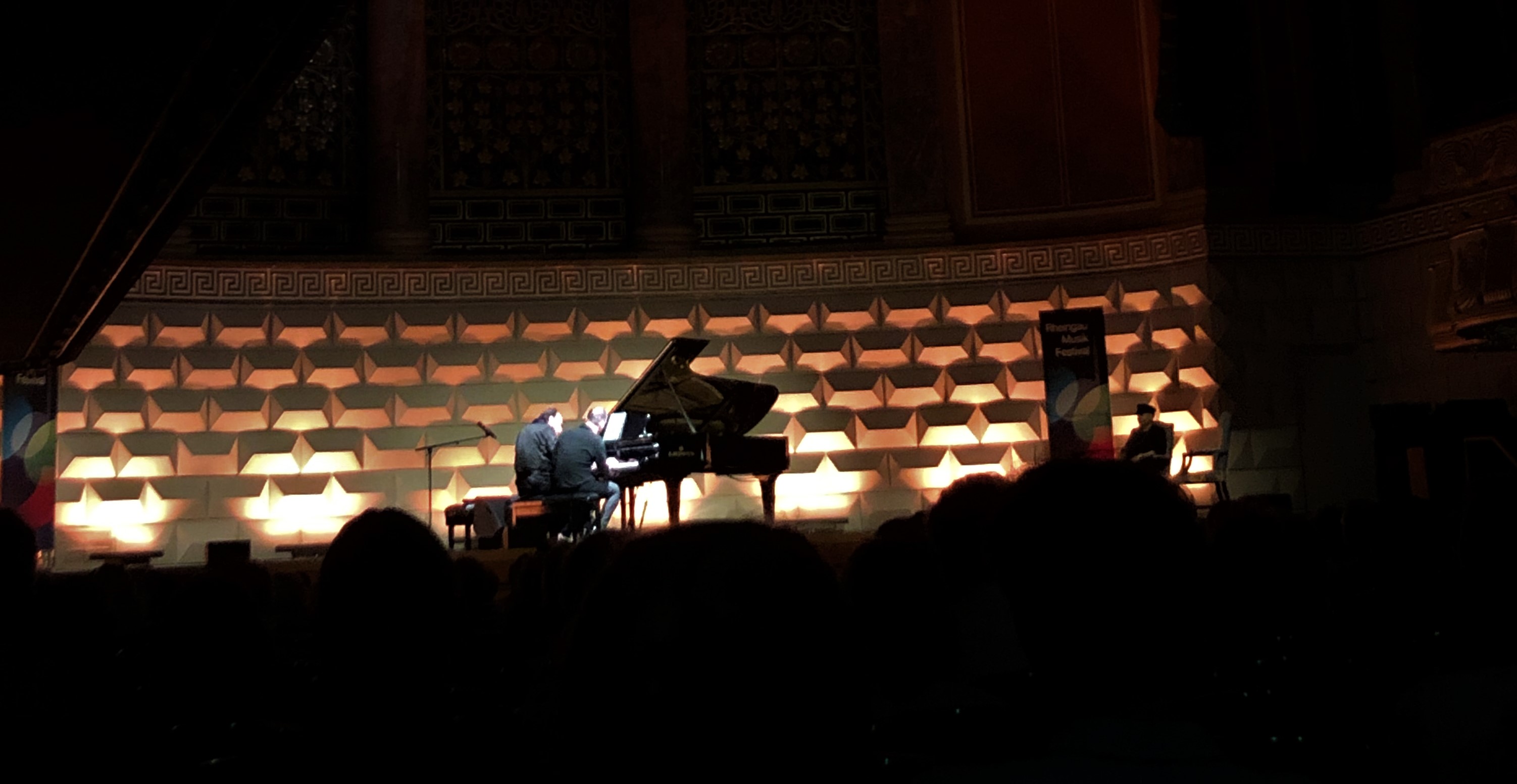 When the hair on your arm is in a state of permanent erection and your eyes become instantly wet, you know you’re experiencing something extraordinary. In this case, it was the ménage à trois of some of the greatest piano artists of our time at the prestigious Rheingau Musik Festival: Chilly Gonzales, the fierce musical polymath, Igor Levit, the courageous classical interpreter, and the epitome of lyrical, Malakoff Kowalski. Continue reading
When the hair on your arm is in a state of permanent erection and your eyes become instantly wet, you know you’re experiencing something extraordinary. In this case, it was the ménage à trois of some of the greatest piano artists of our time at the prestigious Rheingau Musik Festival: Chilly Gonzales, the fierce musical polymath, Igor Levit, the courageous classical interpreter, and the epitome of lyrical, Malakoff Kowalski. Continue reading
Orinoco Runs Deep
“Enya: A Treatise on Unguilty Pleasures” – review and reflection
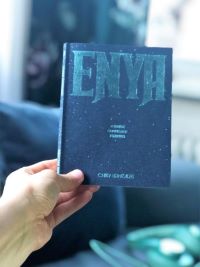 It’s been almost 9 months now, since the virus has turned the world upside down. Time, in which Chilly Gonzales birthed a song with Gary Barlow called “Oh What a Day” (alongside Barry Manilow on the same album), recorded a Christmas album and wrote a book about Enya. Some people would call every single element of each “bad taste” initially. Why? Because what we wear, like and listen to is a form of social demarcation. Take the typical hipster as an example: “somebody trying too hard to be different by rejecting anything that is deemed popular. [...] hipsters aren’t actually different at all, they’re just people that are snobbier and more annoying about their taste in ‘alternative’ things, which are all popular now thanks to the other hipsters.” (Urban Dictionary) The hipster is the extreme representation of a trap we fall prey to in different forms when we transition from innocent, uninfluenced children to beings who have learned about effect, reaction and manipulation. In an attempt to be cool, more distinct and outclass others, we deny things we actually love, and intellectually adopt what we think we should like. We foster those well-groomed pets in the rational chamber of our brains and cage the wild spirits that once lived in our souls and nurtured our emotions in the forbidden “guilt box”. The book is a plea to rerelease our authentic, pre-adolescent, guilt-free selves – or rather that’s the afflatus I draw from it. Continue reading
It’s been almost 9 months now, since the virus has turned the world upside down. Time, in which Chilly Gonzales birthed a song with Gary Barlow called “Oh What a Day” (alongside Barry Manilow on the same album), recorded a Christmas album and wrote a book about Enya. Some people would call every single element of each “bad taste” initially. Why? Because what we wear, like and listen to is a form of social demarcation. Take the typical hipster as an example: “somebody trying too hard to be different by rejecting anything that is deemed popular. [...] hipsters aren’t actually different at all, they’re just people that are snobbier and more annoying about their taste in ‘alternative’ things, which are all popular now thanks to the other hipsters.” (Urban Dictionary) The hipster is the extreme representation of a trap we fall prey to in different forms when we transition from innocent, uninfluenced children to beings who have learned about effect, reaction and manipulation. In an attempt to be cool, more distinct and outclass others, we deny things we actually love, and intellectually adopt what we think we should like. We foster those well-groomed pets in the rational chamber of our brains and cage the wild spirits that once lived in our souls and nurtured our emotions in the forbidden “guilt box”. The book is a plea to rerelease our authentic, pre-adolescent, guilt-free selves – or rather that’s the afflatus I draw from it. Continue reading
Solo Piano III: Un, Deux, Trois (Battre Sync)
 For most of us, hard work achieves short-term goals that will likely be consumed and seen by a few people — ourselves, co-workers, friends, and so on. Even people whose work is seen by millions of people know that change is relatively constant; web designs that work today will be overrun in a few months, and authors can publish second editions. Imagine you had only one shot to create something to be consumed by millions of people. Continue reading
For most of us, hard work achieves short-term goals that will likely be consumed and seen by a few people — ourselves, co-workers, friends, and so on. Even people whose work is seen by millions of people know that change is relatively constant; web designs that work today will be overrun in a few months, and authors can publish second editions. Imagine you had only one shot to create something to be consumed by millions of people. Continue reading
Solo Piano III – Pure Pianodom
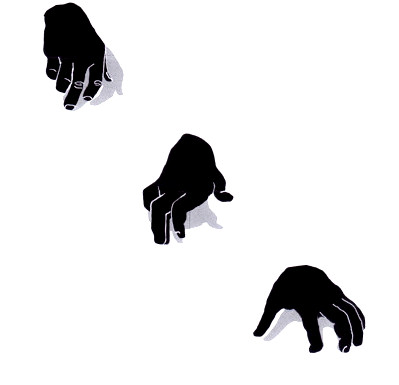 Being futuristic these days means being futuristic on your own terms
Being futuristic these days means being futuristic on your own terms
It appears that Gonzales took his own “Entertainist” lyrics to heart; Solo Piano III represents a gorgeous evolution of solo piano music – a way forward that attracts new fans without alienating current ones. In our eyes (or ears), Solo Piano III is the future; it leads the way into a world filled with musical craftsmanship and beautiful harmonies, where there is time to gaze into the distance and contemplate life, to love, cry, and (of course) have a good laugh. Continue reading
Solo Piano III: A Triad of Life
Tomorrow is the day we have all been waiting for: Solo Piano III will finally be here. Fortunately, we were at the premiere in Geneva. Unfortunately, Gonzo didn’t play the full album – however: Fortunately, the few pieces made my soul rejoice. Unfortunately, the Ostinato made me aware I’ll never ever reach heavenly Aretha’s voice. Fortunately, Gonzo gone Beast for a minute, played the drums like the most freakin’ Muppet. Unfortunately, my amateur rhymes are just a rapper’s spit turned into foam. Fortunately, this idea here killed the white paper syndrome. Unfortunately, “Fortunately, Unfortunately” was the first and only “Soft Power” song he played live in ages. Fortunately, it’s a (re-)start – those pieces belong to the stages.
I know this sounds much better in its original form, but it expresses what the whole concert made obvious: Gonzo embraces his whole oeuvre like never before. The upcoming album is not only a sign of the times, but a statement from a musical humanist.

